The right accounting software shouldn’t just crunch numbers but also help manage financial data and workflows, guide decisions, and positively impact your bottom line.
QuickBooks Online and NetSuite are two of the most popular providers available today, but they cater to very different types of businesses.
QuickBooks is often the first choice for small businesses that want a cloud-based accounting solution with basic automation and ease of use. NetSuite, on the other hand, is a complete enterprise resource planning (ERP) system. It goes beyond accounting to support complex business processes, including:
- Customer relationship management 🤝
- Order management 🛒
- Project tracking and categorization 📋
- Inventory management 📦
If you’re trying to decide between QuickBooks and NetSuite, it’s time to take a look at your business needs and budgeting. Are you mainly focused on managing cash flow and staying on top of bookkeeping, or do you need a system that integrates multiple departments, supports multiple subsidiaries, and helps with forecasting and decision-making? 🤔
While both platforms offer value, many small businesses may find that what they really need is a CRM that works hand-in-hand with their accounting system. Method CRM becomes an efficient choice as a fully customizable CRM built for QuickBooks users who want to automate their operations, streamline customer management, and grow without outgrowing their tools.
Method CRM has been supporting QuickBooks-based businesses since 2010, helping them take control of their workflows, boost efficiency, and stay connected with customers with an instant, two-way QuickBooks sync; end-to-end sales automation; and customization services that allow them to tailor their workflows to their unique business needs. 🚀📈
In this article, we’ll compare QuickBooks Online and NetSuite in detail, looking at their key features, pricing, automation capabilities, real-time data access, scalability, and overall functionality. By the end, you’ll have a clear understanding of which software is the better fit for your company’s current goals and future growth. 🌱
Ready to compare QuickBooks vs NetSuite? Let’s dive in.
Table of Contents
Why QuickBooks feels safe ✅
QuickBooks Online is often the first accounting software many small business owners turn to, and there’s a good reason for that. It’s simple, intuitive, and gets the job done when your needs are straightforward.
Built for small business accounting 🧾
QuickBooks was designed for small businesses. Its user-friendly interface makes onboarding fast and painless, even for teams without a dedicated finance department. You can set up basic accounting functions like invoicing, accounts payable, and expense tracking with minimal fuss. The built-in templates and clear navigation allow business owners to handle day-to-day bookkeeping without needing advanced technical skills.
For freelancers, startups, and service-based small businesses, QuickBooks Online offers a reliable way to manage cash flow, stay compliant, and generate basic financial reports to monitor financial health.
Strength in simplicity 💪
The appeal of QuickBooks is its simplicity. It covers the core accounting tasks most small businesses need, including creating invoices, recording expenses, generating profit and loss reports, and reconciling bank accounts. Thanks to its cloud-based setup, it’s easy to access from anywhere, and it integrates with a wide range of popular add-ons.
However, that simplicity has its limits.
QuickBooks Online allows a limited number of users on most plans, and its functionality can feel restrictive as your business operations grow to a medium-sized business or even a large enterprise. The reporting is solid for basic insights, but it lacks the depth and flexibility you might need when scaling.
When your QuickBooks-run business needs more ➡️
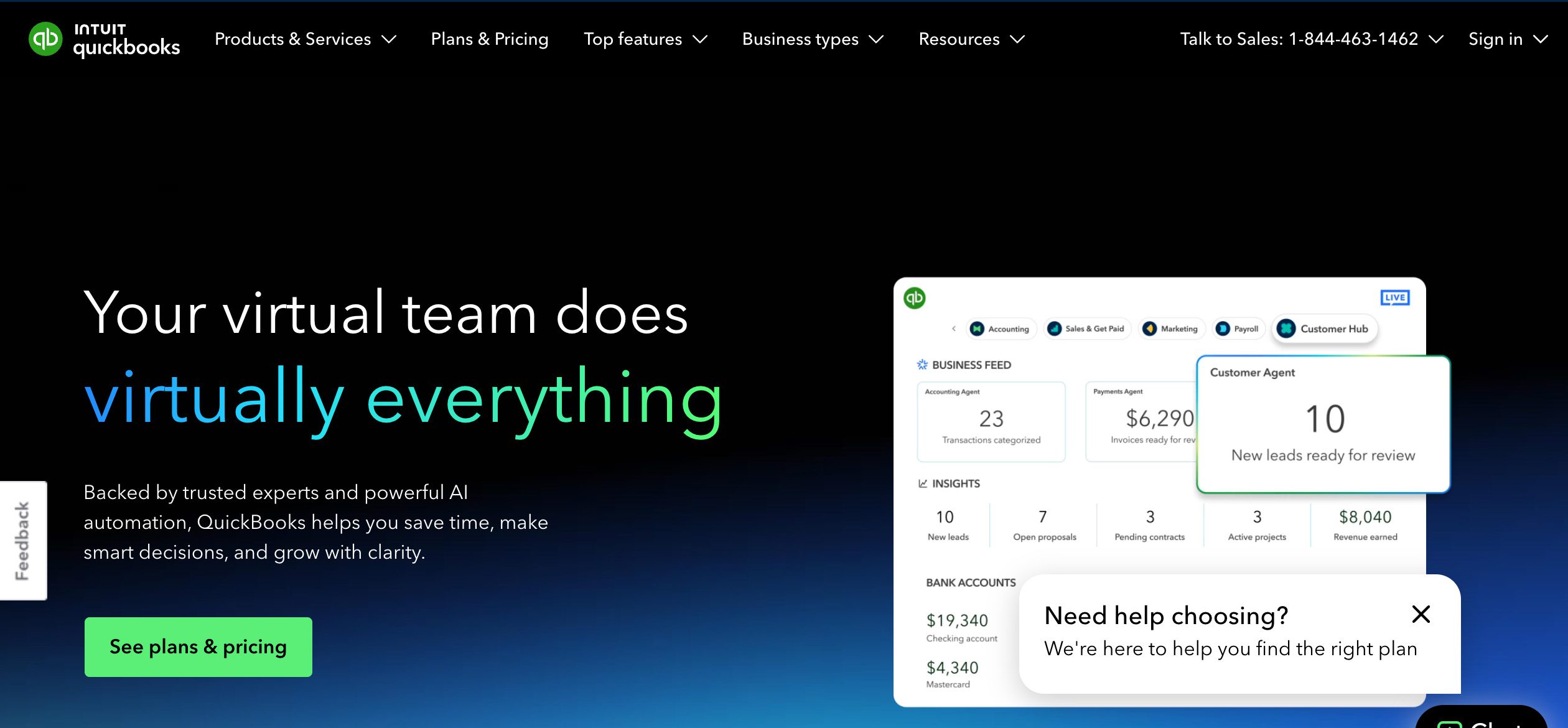
You may feel the need to search for additional software for your QuickBooks-run business as it scales and becomes more complex, especially if you’re managing multiple teams, products, or clients.
When you start needing enterprise-level features like supply chain management visibility, automated revenue recognition, or customer relationship management, QuickBooks can feel more like a stepping stone than a long-term solution.
In the next section, we’ll explore how NetSuite fills in these gaps and whether it’s the right fit for your growing business.
Why NetSuite is the heavy-duty ERP 🏋
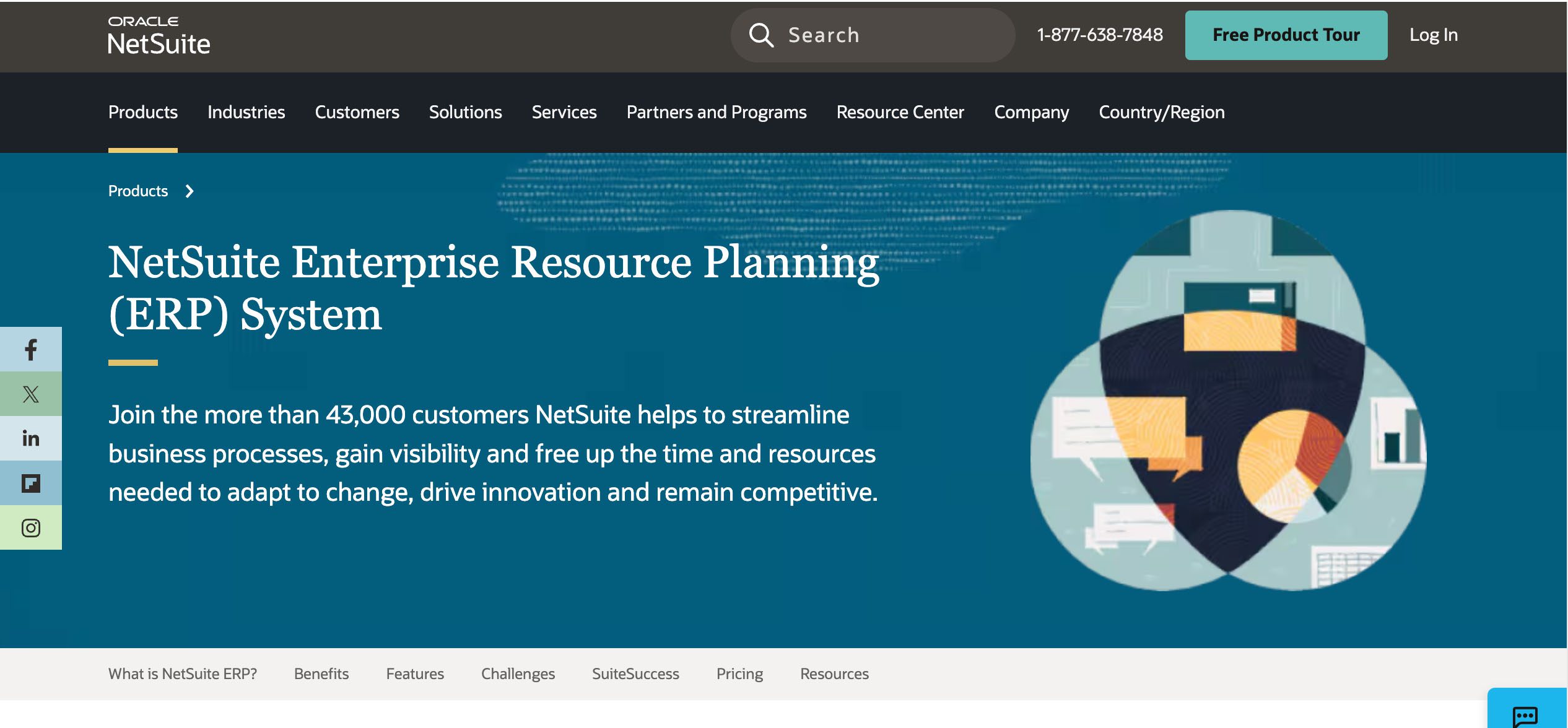
When growing businesses outgrow basic accounting management software, NetSuite steps in as a full ERP system built for scale. It combines financial management, CRM, inventory management, and project tracking in one cloud-based platform.
Advanced functionality out of the gate ⚙️
NetSuite offers end-to-end visibility with real-time dashboards, multi-currency support, fixed assets, and consolidated financial reporting. It comes with advanced features that go far beyond basic bookkeeping or invoicing.
Automation and global scale 🌎
NetSuite supports complex workflows like revenue recognition, lease management, and tax compliance. Automation tools streamline tasks across departments, and AI insights help improve forecasting and decision-making. This makes it ideal for e-commerce, SaaS, and international operations.
Cost and complexity 💰
NetSuite has a broad cost range, with pricing increasing based on users, modules, and implementation needs. It is powerful but not plug-and-play. Many companies require an IT team or ERP consultant to set up and maintain it.
Some users report missing conveniences like manual bank matching or a steeper learning curve, saying it feels harder to learn than when they use QuickBooks. Still, for businesses that need serious scalability, NetSuite accounting delivers enterprise-level control and customization.
That said, not every business needs the power (or price tag) of a full ERP. For small businesses that run on QuickBooks, Method CRM offers a smarter step up, bringing automation, customization, and real-time data sync without the complexity or overhead. It’s designed to work the way small businesses already do, with the flexibility to grow alongside them.
If you are looking for other NetSuite alternatives, check out this list of options for your business.
Enter Method CRM — The Smart Upgrade 🤓☝️
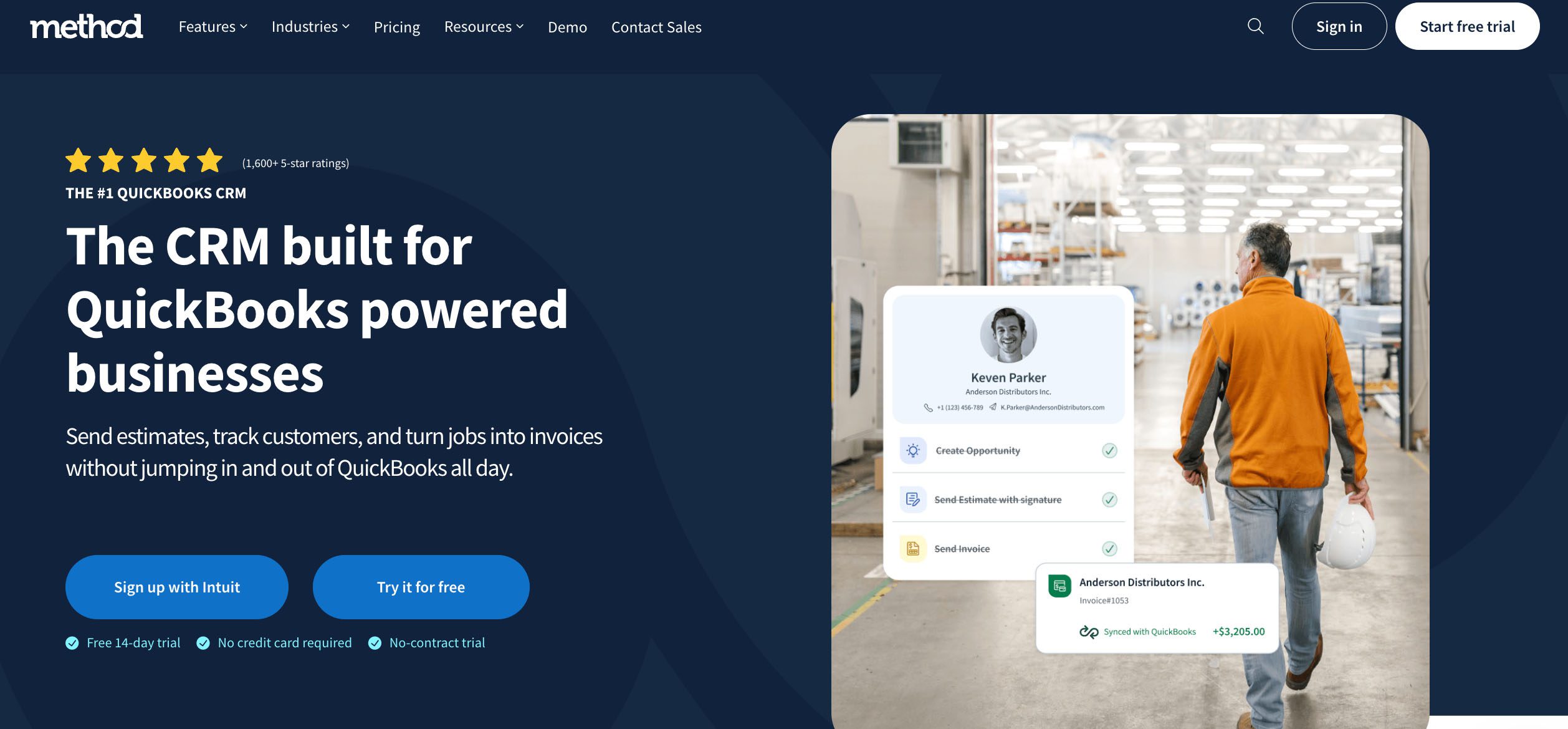
For growing businesses that have hit the ceiling with QuickBooks but aren’t ready for the cost or complexity of NetSuite, Method CRM offers the perfect middle ground. It fills the functionality gap with automation, CRM, and project visibility without requiring a full ERP system.
While NetSuite integrates all its features into one unified platform, which can lead to complexity and rigidity when scaling or adapting to new business needs, Method CRM provides a flexible, integrated ecosystem. It allows businesses to connect various tools, improving efficiency and adaptability.
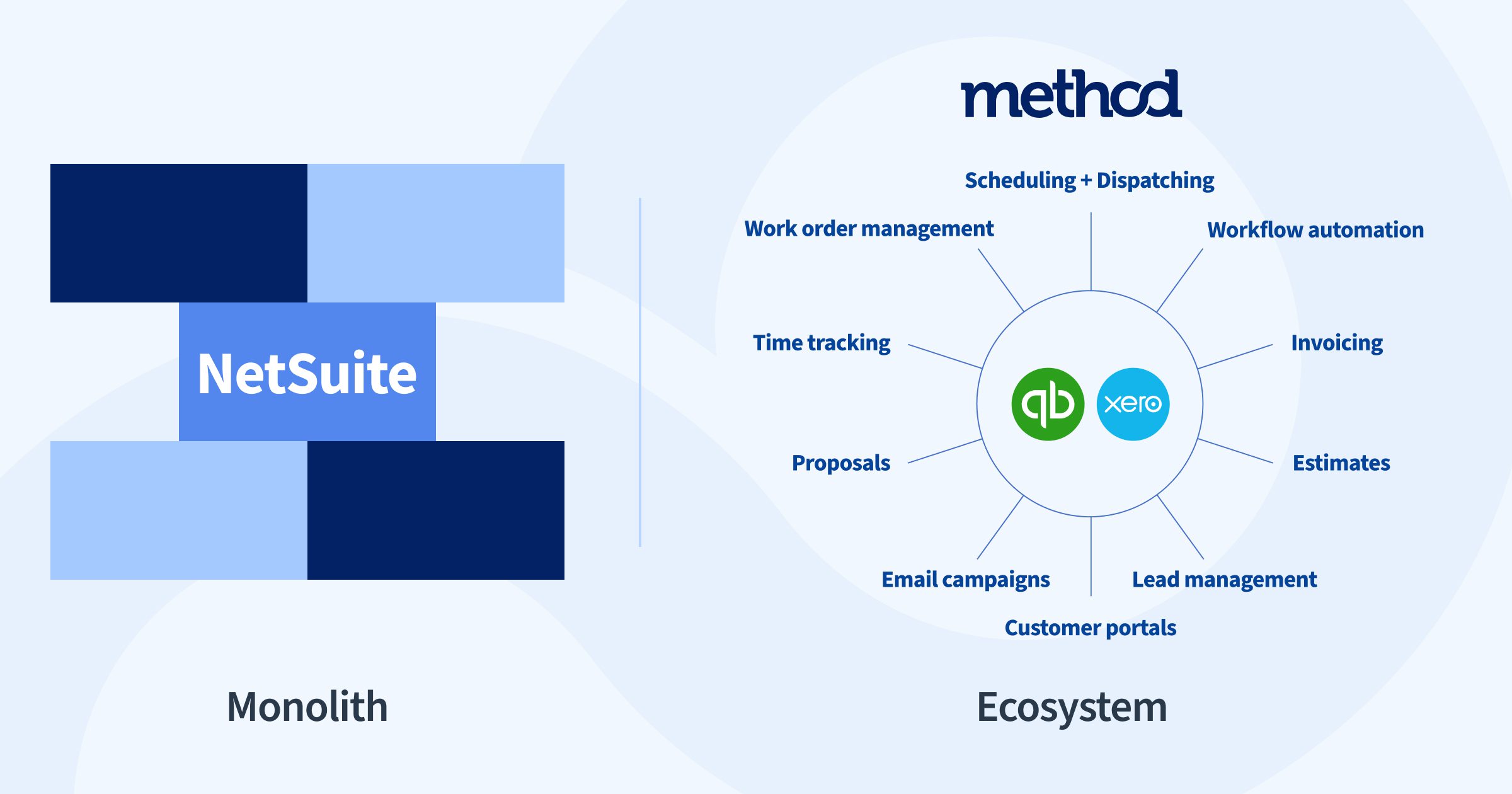
What is Method CRM? 🧐
Method CRM is a cloud-based software solution that offers a deep, two-way sync with QuickBooks Online and QuickBooks Desktop. Every estimate, invoice, payment, and customer update flows back and forth between systems in real time. This eliminates double entry, reduces manual errors, and gives your team up-to-date access to financial data and client history.
The platform is designed to streamline business processes and give small businesses a way to automate workflows without leaving the QuickBooks ecosystem.
With Method, you can build an end-to-end lead-to-cash cycle with automated follow-ups, task management, and custom pipelines. It includes built-in customer relationship management, e-signature integration for quotes, real-time dashboards, and custom workflows tailored to your business needs.
Whether you’re managing sales, customer support, or project workflows, Method helps unify your operations while keeping QuickBooks at the core.
Pricing that scales with you 📶
Unlike NetSuite, which can cost thousands per month and often requires outside consultants to implement, Method CRM is priced for small to mid-sized businesses. Plans start affordably and grow with you, so most businesses can get up and running without a lengthy implementation cycle.
Method is ideal for QuickBooks users looking for more functionality, automation, and CRM features without committing to a full ERP solution like Oracle NetSuite.
Choosing the right software ride 👍🚘
Different stages of business growth need different tools. Picking the right software is like choosing the right vehicle. Using the wrong one can slow you down or steer you off course.
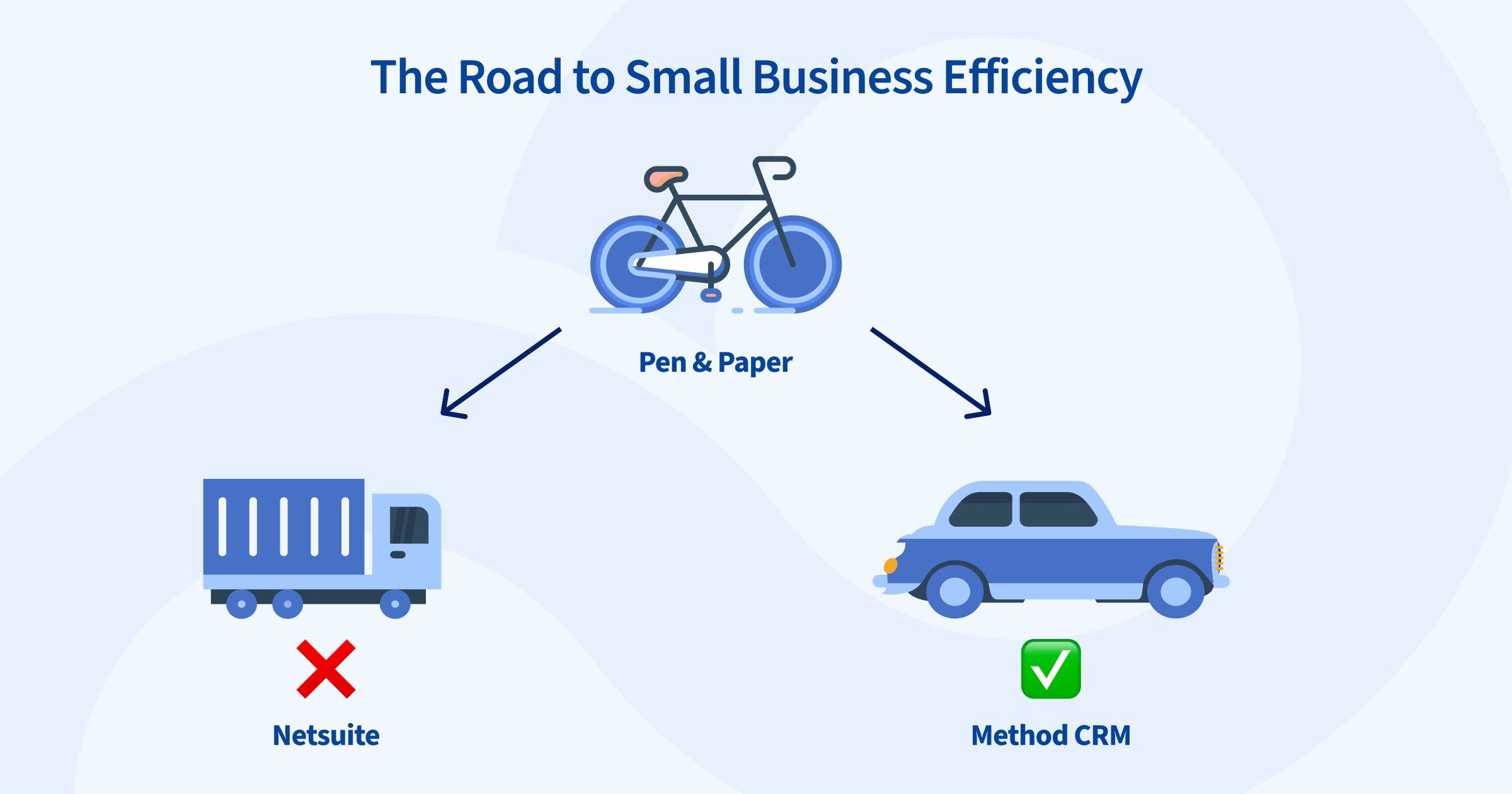
Pen and paper = the bicycle 🚲
You’re technically moving forward, but at a crawl. Think Excel spreadsheets, sticky notes, or the most basic accounting software or CRM.
For brand-new startups or solopreneurs, this setup might work in the short term. But as customer lists grow, invoices pile up, and processes get more complex, manual tools quickly become risky and inefficient. The cracks start showing in missed follow-ups, duplicate data entry, and poor visibility into cash flow.
NetSuite = the transport truck 🚛
NetSuite is built for large-scale operations. It supports global financial management, complex on-premise inventory tracking, multi-currency transactions, and real-time reporting across multiple subsidiaries.
It’s incredibly powerful but also expensive, complex, and time-consuming to implement. It often requires an ERP consultant to set up, and learning to use it can feel like trying to drive an 18-wheeler before you have even passed your road test.
For most small businesses, it is more system than you need. You end up paying for enterprise-level functionality that doesn’t match your current business processes or size.
QuickBooks + Method CRM = the reliable car that gets you there 🚗
When you combine QuickBooks’ trusted accounting tools with Method CRM’s automation and customer relationship management features, you get a system that is built for growth and still easy to manage.
QuickBooks handles your bookkeeping, invoicing, and financial reports. Method adds lead management, workflow automation, project tracking, and real-time syncing between customer activity and financial data.
Together, they give you the flexibility and scalability to grow your business without overcomplicating your software setup. You get better visibility, fewer manual tasks, and a solution that fits how small businesses actually work.
It is the smart, comfortable upgrade that helps you move faster without trading ease of use for complexity.
QuickBooks vs NetSuite vs QuickBooks with Method — Side by side ⚖️
Choosing between QuickBooks, NetSuite, or combining QuickBooks with Method CRM depends on your business stage, your processes, and how much complexity you’re ready to manage. Here’s how they stack up.
Functionality matrix
| Feature | QuickBooks Online | NetSuite ERP | QuickBooks + Method CRM |
| Accounting basics | Yes | Yes | Yes |
| CRM | Limited | Built-in | Full CRM with automation |
| Inventory management | Basic | Advanced | Advanced |
| Workflow automation | Limited | Full enterprise automation | Fully customizable workflows |
| Multi-user scale | Moderate | High | Scales with team size |
| Real-time dashboards | Basic | Yes | Yes |
| Project management | No | Yes | Yes |
| Revenue recognition | Yes, in QuickBooks Online Advanced | Yes | Supported through QuickBooks |
QuickBooks covers the essentials of bookkeeping, invoicing, and expense tracking. NetSuite delivers advanced ERP capabilities for large-scale businesses, including complex financial reporting and multi-subsidiary operations. Method CRM fills the gap for growing small businesses that need more functionality and automation without the jump to full ERP.
Cost and complexity comparison 🔍
| Category | Intuit QuickBooks | NetSuite ERP | QuickBooks + Method CRM |
| Base pricing | Affordable monthly plans | Starts at $1,000+ per month | Method plans start at $27/user/month |
| Setup time | Quick and easy | Long setup with consultants | Fast, with onboarding support |
| Customization | Limited | Extensive but complex | Expert-led customization services |
| Additional costs | Add-ons per feature | High per user and per module | Predictable pricing |
| Learning curve | Low | Steep | Low to moderate |
| Tech team required | No | Often yes | No |
QuickBooks is affordable and user-friendly. NetSuite is powerful but can be overkill for small businesses. Method CRM provides advanced workflows, CRM, and automation on top of QuickBooks with a much lower barrier to entry.
Ideal use cases by business stage 👌
| Business Stage | Best Fit |
| Startup or new small business | QuickBooks Online |
| Growing SMB needing workflows | QuickBooks + Method CRM |
| Large enterprise or multinational | NetSuite ERP |
If your business is just starting out, QuickBooks alone handles the core accounting functions without complication. As your client base and operations grow, Method CRM gives you the automation, customer relationship management, and custom workflows you need. And when your business becomes global, with complex reporting, subsidiaries, and high-volume transactions, NetSuite becomes a fitting choice.
Is it time to add Method instead of jumping straight to NetSuite? 🕒
As your business scales, it’s natural to look for tools that go beyond QuickBooks. NetSuite is a powerful ERP solution that supports large, complex organizations. But for many small businesses, it may offer more than they currently need. Method CRM provides a more accessible path forward by extending QuickBooks’ functionality without requiring a full ERP migration.
Here are common signs it might be time to upgrade, but not necessarily to NetSuite.
You’re spending too much time in spreadsheets: If you’re exporting data to Excel to track leads, manage quotes, or monitor client activity, it’s a sign your current system isn’t keeping up. Method CRM integrates directly with QuickBooks, offering real-time visibility and reducing the need for manual workarounds.
You want to automate sales, quotes, or follow-ups: Method CRM offers automation to manage recurring tasks like quote approvals, reminders, and customer onboarding. This helps streamline your day-to-day operations.
You need CRM functionality connected to financial data: NetSuite includes built-in CRM and sales modules, but not every business needs that level of scale right away. Method CRM fills the gap for small to mid-sized businesses by adding customer relationship management to your QuickBooks setup without replacing your entire system.
You are hitting QuickBooks’ limits, but aren’t ready for NetSuite: NetSuite offers capabilities like consolidated reporting, multi-currency support, and global scale. However, it often requires specialist support, significant setup time, and a higher price point. If you’re not ready for that investment, Method CRM offers a middle ground. You get automation, CRM, and dashboards with less cost and complexity.
If you’re a growing business looking to bridge the gap between simple accounting and a full ERP solution, Method CRM helps you move forward confidently, without overextending your budget or resources.
How to transition smoothly 🔀
Moving from basic accounting tools to a more powerful business management system doesn’t have to be overwhelming. Contrary to jumping into a full ERP platform like NetSuite, adopting Method CRM is a practical next step that keeps your business agile while giving you more optimization for your specific needs.
Here’s how to make the transition seamless:
1. Keep QuickBooks as your accounting engine
QuickBooks continues to handle your core accounting functions like invoicing, expense tracking, and financial reporting. You don’t need to migrate financial data or retrain your entire team.
2. Install Method CRM and connect it
Method integrates directly with QuickBooks in real time. You get two-way syncing of contacts, transactions, and activity history, such as time tracking, with no need for manual imports or duplicate entry.
3. Map out your business workflows
Look at how your sales, quoting, and client onboarding processes currently work, then use Method’s workflow automation tools to streamline those steps. From lead capture to revenue recognition, Method lets you customize workflows without needing to write code.
4. Train your team
Method’s user-friendly interface and logical layout make training simple. No ERP consultants required. Most teams are up and running in days, not weeks.
5. Scale as needed
As your client base grows, so can your system. Add new workflows, users, or modules when you’re ready. Since you’re not locked into a large ERP investment upfront, you scale at your own pace, keeping control over complexity and cost.
Conclusion 💡
Not every business needs a transport truck. If you’re running a small to mid-sized company, trying to scale by jumping straight into a full ERP system like NetSuite can be more trouble than it’s worth.
QuickBooks offers a reliable engine for basic accounting, but when growth kicks in, you may need more than just the basics.
QuickBooks plus Method CRM gives you the best of both worlds: the ease and familiarity of QuickBooks, combined with the automation, CRM, and real-time workflows that growing businesses need.
It’s a flexible, cost-effective solution built for the way small businesses manage their KPIs without the long setup time, high costs, or steep learning curve of enterprise software.
Ready to drive your business forward? Start a free trial of Method CRM and experience the power of streamlined automation, synced financials, and scalable growth without switching platforms. 🔄💻😎👍






